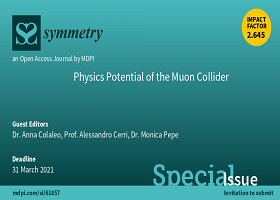Physics Potential of the Muon Collider
A special issue of Symmetry (ISSN 2073-8994). This special issue belongs to the section "Physics".
Deadline for manuscript submissions: closed (30 June 2023) | Viewed by 3376

Special Issue Editors
2. Istituto Nazionale di Fisica Nucleare (INFN), Sezione di Bari, Via Amendola 173, 70125 Bari, Italy
Interests: experimental high energy physics; particle and nuclear physics instrumentation; detector developments; the standard model of particle physics; particle physics beyond the standard model; data handling and analysis; medical physics
Interests: particle physics
Special Issue Information
A muon collider has great potential to explore the high energy frontier. A multi-TeV machine with sufficient luminosity will be a great opportunity to probe the most intimate nature of the Standard Model and the Electroweak Symmetry Breaking mechanism, and to detect new physics both directly and indirectly. At the baseline energies and luminosities a large number of Higgs bosons will be produced mainly through the Vector Boson Fusion (VFB) processes, complementing the study performed at low energy Higgs factories (e+e-) where the main Higgs production mode would be Higgsstrahlung. The muon collider would allow the precise measurement of the Higgs couplings to several SM particles and offer the unique opportunity for the measurement of the trilinear and quadrilinear Higgs couplings. The search for new physics is the main strength of a muon collider running at multi-TeV energies: different SUSY-inspired models and WIMP dark matter scenarios can be explored. Moreover a muon collider operating at very high luminosity poses design challenges that require the development of innovative concepts and technologies.
We invite submissions to this Special Issue on topics related to the physics potentials and challenges at future muon colliders from theoretical and experimental points of view.
Keywords
- Higgs
- Supersymmetry
- Dark matter
- Effective field theory
- Muon collider
- Energy frontier
- Beyond the Standard Model
- Real-time event selection
- Lepton machines
- Vector boson fusion






